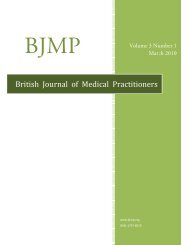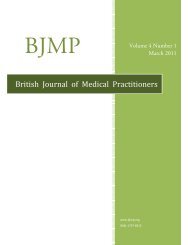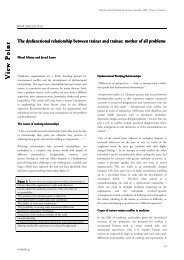R esearch A rticle - British Journal of Medical Practitioners
R esearch A rticle - British Journal of Medical Practitioners
R esearch A rticle - British Journal of Medical Practitioners
You also want an ePaper? Increase the reach of your titles
YUMPU automatically turns print PDFs into web optimized ePapers that Google loves.
<strong>British</strong> <strong>Journal</strong> <strong>of</strong> <strong>Medical</strong> <strong>Practitioners</strong>, March 2013, Volume 6, Number 1<br />
be taken once at night and reviewed regularly. The dose may be<br />
increased, but does not usually need to exceed 30 mg 11 .<br />
Selective serotonin reuptake inhibitors (SSRIs) should be<br />
considered only if TCAs have been ineffective. The<br />
anticholinergic effects <strong>of</strong> TCAs and their ability to prolong<br />
intestinal transit times are the reasons they are particularly<br />
preferred over SSRIs in IBS diarrhoea-predominant.<br />
Furthermore, given the propensity <strong>of</strong> SSRIs to commonly cause<br />
GI adverse events <strong>of</strong> nausea, vomiting, and diarrhoea, indicate<br />
that TCAs may have more utility in IBS diarrhoea-predominant<br />
than SSRIs 12 . Healthcare pr<strong>of</strong>essionals should take into account<br />
the possible side effects when prescribing TCAs or SSRIs. After<br />
prescribing either <strong>of</strong> these drugs for the first time at low doses,<br />
the patient should be followed up after 4 weeks and then at 6–<br />
12 monthly intervals 11 .<br />
Psychological interventions<br />
Anxiety and depression are common in IBS and patients report<br />
a correlation between stress and their symptoms, providing a<br />
rationale for psychological therapy. Referral for psychological<br />
interventions (cognitive behavioural therapy, hypnotherapy<br />
and/or psychological therapy) should be considered for people<br />
with IBS who do not respond to pharmacological treatments<br />
after 12 months and who develop a continuing symptom pr<strong>of</strong>ile<br />
(refractory IBS). 11 Hypnotherapy reduces patient anxiety and<br />
improves symptom control in the majority <strong>of</strong> patients with<br />
refractory IBS. The benefits extend well beyond symptom<br />
control and include improvements in quality <strong>of</strong> life and<br />
reduction in emotional distress 13 . Data from general practice<br />
shows that hypnotherapy is effective during the first three<br />
months, although the effect is less marked after that 6 .<br />
Prognosis <strong>of</strong> IBS depends on the length <strong>of</strong> the history, those<br />
with a long history being less likely to improve. Follow-up<br />
should be agreed between the healthcare pr<strong>of</strong>essional and the<br />
patient based on the response <strong>of</strong> the person's symptoms to<br />
interventions. The emergence <strong>of</strong> any 'red flag' symptoms during<br />
management and follow-up should prompt further investigation<br />
and/or referral to secondary care 11 .<br />
Competing Interests<br />
None declared<br />
Author Details<br />
ALI KHANBHAI, MB ChB DRCOG, GP VTS ST2 Trainee, Queen's Hospital,<br />
Rom Valley Way, Romford, Essex, RM7 0AG, United Kingdom. DALJIT<br />
SINGH SURA, MBBS BSc DRCOG DFSRH MRCGP, General Practitioner,<br />
North Street <strong>Medical</strong> Care, Romford, RM1 4QJ, United Kingdom.<br />
CORRESSPONDENCE: ALI KHANBHAI, GP VTS ST2 Trainee, Queen's<br />
Hospital, Rom Valley Way, Romford, Essex, RM7 0AG, United Kingdom.<br />
Email: ali.dh.kh@gmail.com<br />
REFERENCES<br />
1. DiBonaventura M, Prior M, Prieto P, et al. Burden <strong>of</strong> constipationpredominant<br />
irritable bowel syndrome (IBS-C) in France, Italy, and the<br />
United Kingdom. Dove Press. Clinical and Experimental<br />
Gastroenterology. Nov 2012<br />
2. El-Salhy M. Irritable bowel syndrome: Diagnosis and pathogenesis.<br />
World <strong>Journal</strong> <strong>of</strong> Gastroenterology 2012 October 7; 18(37): 5151-<br />
5163<br />
3. Ford AC. Irritable Bowel Syndrome. Clinical Evidence 2010;01:410<br />
4. Chey WD, Maneerattaporn M, Saad R. Pharmacologic and<br />
Complementary and Alternative Medicine Therapies for Irritable Bowel<br />
Syndrome. Gut and Liver 2011 September, Vol. 5, No. 3, 253-266<br />
5. Saito YA, Schoenfeld P. The epidemiology <strong>of</strong> irritable bowel syndrome<br />
in North America: a systematic review. American <strong>Journal</strong> <strong>of</strong><br />
Gastroenterology 2002 Aug;97(8):1910-5<br />
6. Spiller R, Aziz Q, Creed F, et al. Guidelines on the irritable bowel<br />
syndrome: mechanisms and practical management. Gut 2007;56:1770–<br />
1798<br />
7. Adeyemo MA, Spiegel BMR, Chang L. Meta-analysis: do irritable<br />
bowel syndrome symptoms vary between men and women Alimentary<br />
Pharmacology & Therapeutics 2010 September ; 32(6): 738–755<br />
8. Saito YA. The Role <strong>of</strong> Genetics in IBS. Gastroenterology Clinics <strong>of</strong><br />
North America. March 2011;40(1): 45–67<br />
9. Farup PG, Sperber AD, Simr M. Irritable Bowel Syndrome.<br />
Gastroenterology R<strong>esearch</strong> and Practice. Volume 2012 (A<strong>rticle</strong> ID<br />
612479)<br />
10. Drossman DA, Morris CB, Hu Y, et al. A prospective assessment <strong>of</strong><br />
bowel habit in irritable bowel syndrome in women: defining an<br />
alternator. Gastroenterology 2005;128:580–589<br />
11. Irritable bowel syndrome in Adults. Diagnosis and management <strong>of</strong><br />
irritable bowel syndrome in primary care. National Institute for Health<br />
and Clinical Excellence (NICE). February 2008<br />
12. Olden KW. Targeted therapies for diarrhea-predominant irritable<br />
bowel syndrome. Dove press. Clinical and experimental<br />
gastroenterology. May 2012<br />
13. Ford MJ, Dobbin A. Hypnosis and the management <strong>of</strong> patients with<br />
refractory IBS. <strong>Journal</strong> <strong>of</strong> the Royal College <strong>of</strong> Physicians 2006;<br />
36:293–298<br />
BJMP.org<br />
37







